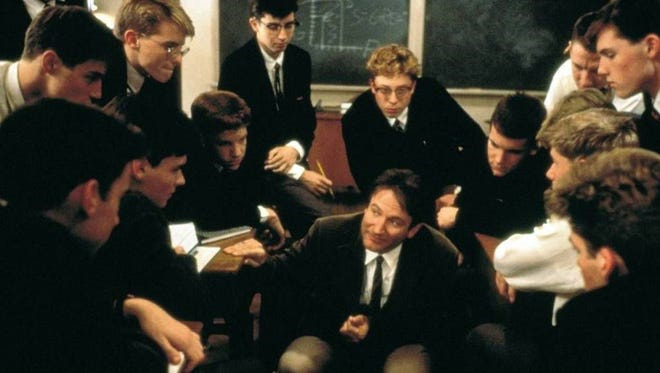Back to School at last
After months of absence, with parents battling to juggle their own workload with home tutoring and teachers struggling with the difficulties of educating online, schools are finally reopening. This has prompted some reflection on my part as to the importance of what happens in the classroom and how some teachers left an indelible mark on me.
I often review the list of my top five favourite films of all time, occasionally reshuffling and revising the options or adding in a new one, but it will take a truly remarkable production to knock Dead Poet’s Society off its perch among those five.
Something about the camera work that captures the gorgeous scenery as Autumn turns to Winter around the grounds of the boarding school where the action is set; the depth and warmth of the characters; the familiar classroom customs and banter that bring back memories of my own days at the chalkface. It encapsulates the energy of youth and schooldays, the excitement of discovery, the secret dens and clandestine midnight meetings, the heady illusion of limitless possibilities. And of course, there’s Robin Williams’s character, the enthralling, persuasive Mr Keating and the extraordinary hold he has over the boys.
Anyone familiar with the story will know that it doesn’t end well, and finally raises concerns surrounding the power and influence a charismatic individual can have, despite good intentions. It explores the potential harm done by taking too literally a role model who has cast a spell, and whose ideas some may consider romantic and idealistic.
Responsibility for the devastating climax of the film is not laid solely or even primarily with the teacher. We are also encouraged to question the suffocating expectations of family, society and education at the time – yet there is no doubt in my mind that an individual teacher can work magic. Did I have a Mr Keating in my childhood and adolescence? Probably one or two, although they are not commonplace by any means.
My magical teachers
A certain, rather rigorous, primary school teacher taught us to write good English, communicate effectively and broaden our stockpile of words. I remember him getting us to lie on the ground beneath the trees on the school field one February morning and look up, gaze at the pastel blues and pinks of the winter sky, then go indoors and paint it using fine horizontal brushstrokes, then express the same sight in writing. I owe much to him.
Perhaps surprisingly, the teachers that stand out are those who imposed the tightest discipline. By discipline, obviously I don’t mean the near starvation, thrashing and bullying endured by David Copperfield or Oliver Twist, but an environment with order, structure and clear boundaries that offered clarity and enabled progress. Well, maybe I’m being a little unfair here. After all, in the early 1970s, we didn’t feel any sense of outrage when our secondary school Maths teacher bashed a fellow pupil over the head with a hardback textbook for not doing his homework, which happened on a weekly basis, usually to the same luckless boy. Doing our algebra in total silence, then queuing at her desk to have it marked, was routine, and those of us with the misfortune to be walking behind her when passing through the swing doors, small, defenceless and armless since loaded with bags of books, musical instrument cases and PE kits, could expect to have them slammed in our noses.
But she was a brilliant teacher. My understanding of Maths, and thereby my results, suffered drastically once we entered the next stage and our set was passed onto her colleague who wasted time talking about Millwall football club, and this was always a mystery to me because he had a Birmingham accent. As cliché as it sounds, there is some truth around the laid back, bearded, ex-hippy Geography teacher stereotype of that era, strumming the guitar in assemblies a little like Dylan from the Magic Roundabout. Teachers who were “in” with the sixth formers, invited us to parties (now unacceptable) or sat lounging and chatting in our common room, were not normally rewarded with favourable results.
I was lucky enough to have the same French teacher for five years, from 11 to 16. An even-tempered, even-handed person who struck the perfect balance between too lenient and too stifling. Always consistent, always cheerful and always reliable. He would walk into the room, raise his arms in the air and call out “Bonjour la classe!”, and rising to our feet, we would reply “Bonjour Monsieur Howarth”, before being told “Asseyez-vous”.
Routine and enthusiasm
His style was unremarkable in its simplicity, but effective. We had 40 minutes a day, 4 days a week, beginning with one dedicated to listening and pronunciation that took place in what was then called the language lab, where we sat in individual booths wearing headphones, repeating what we heard and working through exercises while the teacher would listen in and occasionally interject with encouraging remarks to individual pupils. I can still hear the sound of the introduction playing at the start of the lesson, in a piercing voice, “French: a structural approach, book 1….”. Tuesdays and Wednesdays were given over to grammar and reading comprehension respectively, then every Friday there would be a vocabulary test, in preparation for which we would have to memorise 10 words, along with their definite articles, spellings and English meanings. Grammar was introduced in hierarchical fashion, starting with adjectives, the present tense verbs, often drilled into the mind by chanting.
Over the next few years, we assimilated other verb tenses and grammatical features in order of difficulty. Homework normally involved written composition, of increasing length and difficulty, and although this scrupulously didactic routine and echoing might be regarded by some as outdated and dull, it worked. His own steadfast, unfaltering enthusiasm also taught me to push through and stick to the plan on those days where energy is low and motivation is difficult, and to always remember that you are often making progress when you don’t think you are, and that a better day lies ahead. By the time we were at the end of the fifth form, equivalent to year 11, we were all over-prepared for the exams. And now, in the same way as I know without thinking that nine eights are seventy-two because my times tables were drummed into me by repetition, the conjugations of many verbs ring in my ears, so that I don’t have to search too far among my mental shelving when I need them. He used to tell us that knowledge of a language was like a snowball: the larger it gets, the greater the surface area on which to stick on additional material while rolling it along the ground.
My lifelong fascination for foreign languages began with this particular teacher. Another of his legacies was to jump in and have a go. I always feel compelled to make some effort, however modest, to memorise the very basics when I visit a country whose language I do not speak or understand. And thanks to the preparation I was given by my own school French teacher, I was able to help out during numerous French exchange visits and year 12 work experience placement trips in Marseille and Toulouse organised by schools where I taught, despite being a science teacher.
Learning strategies
What I learned from the best of my teachers was the importance of structure, of building from the simple to the complex, from bottom to top. There are certain strategies that have stayed with me for life. When faced with any new challenge, I take the same systematic approach I was introduced to at school: break the work into pieces, begin with what is easiest, divide up the available time appropriately, dedicate different sessions to different tasks. It would be too methodical and plodding for some, but it works for me. When many years later I started to learn Italian, I already had the framework, or reference points, on which to build. I like to think of these as coat hangers: props on which to attach knowledge in rows and layers. I knew how to build the grammar and the vocabulary piece by piece, and that it was important to carve up my time between the skills of speaking, listening, reading and writing. I have my teachers to thank for that. It seems like common sense, but a more random, haphazard approach would not have worked for me.
We all have different learning styles, and authorities on educational theory will tell us that there is no one-size-fits-all approach to teaching and acquiring knowledge. But my message here is that a few well-chosen methods on the part of a teacher can equip pupils with coping mechanisms they will remember for the rest of their days. To Mr Holmes, Mrs Willis and Mr Howarth, thank you.




 RSS Feed
RSS Feed